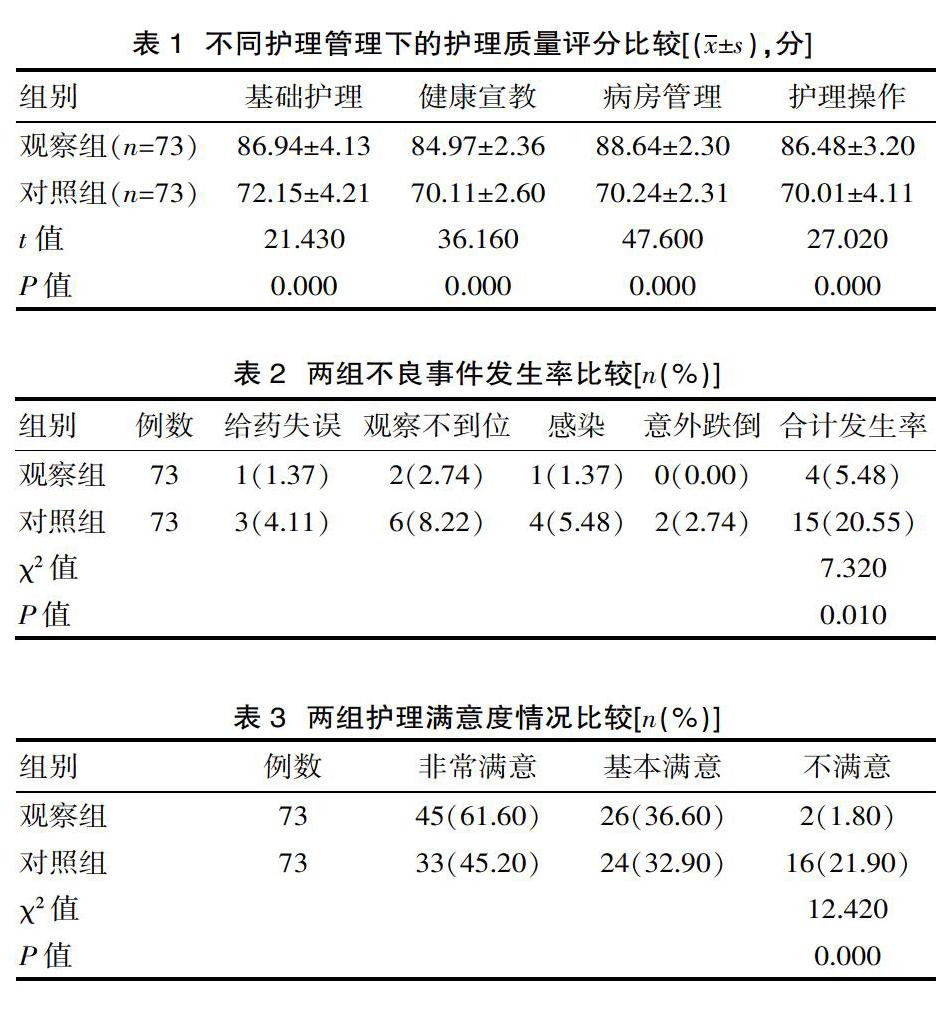观察风险管理在消化内科护理管理中的应用价值
2020-06-12梁艳华
梁艳华

[摘要] 目的 观察风险管理在消化内科护理管理中的应用价值。方法 选择该院消化内科于2018年6月—2019年6月收治的146例患者作为研究对象,随后根据不同护理管理方法将其分为观察组(实施风险管理)与对照组(实施常规护理),每组73例。最后,比较两组患者对不同护理管理下的护理满意度以及相应护理质量情况。结果 消化内科实施风险管理后,其护理质量明显高于常规护理效果,并且观察组在风险管理护理下,其对该院的整体护理满意度水平较高于对照组(P<0.05)。结论 在消化内科护理管理活动中,实施风险管理不仅可以提高护理质量,而且也提高了患者对该院的护理满意程度,因此,该护理管理模式值得实施与开展。
[关键词] 消化内科;风险管理;护理管理;护理质量;护理满意度
[中图分类号] R473.5 [文献标识码] A [文章编号] 1672-5654(2020)02(c)-0102-03
[Abstract] Objective To observe the application value of risk management in nursing management of digestive medicine. Methods 146 patients of Gastroenterology in the hospital from June 2018 to June 2019 were selected as the research objects, and then divided into observation group (implemented risk management) and control group (implemented routine care) according to different nursing management methods, with 73 patients in each group. Finally, compare the satisfaction of two groups of patients with different nursing management and the corresponding quality of care. Results After the implementation of risk management in the Department of Gastroenterology, the quality of nursing was significantly higher than that of conventional nursing, and the observation group under risk management nursing had a higher level of overall nursing satisfaction with the hospital than the control group(P<0.05). Conclusion In the nursing management activities of gastroenterology, the implementation of risk management can not only improve the quality of nursing, but also improve the patient's satisfaction with the nursing care of the hospital. Therefore, this nursing management mode is worth implementing and developing.
[Key words] Gastroenterology; Risk management; Nursing management; Nursing quality; Nursing satisfaction
消化內科涵盖的疾病种类繁多,甚至有的患者因多种疾病并发而加大了临床治疗及护理管理难度。另外,患有消化内科疾病的患者,其病情具有一定的传染性,同时,还有大多数病种具有发病急的特点,以至于对临床治疗及护理提出了更高的要求[1]。随着近年来医疗护理事业的发展,以及护理管理模式的优化与更新,如今护理管理模式相较于传统常规护理模式有了很大的改善,尤其护理质量得到了显著提升,大大降低了风险事件的发生。其中,风险管理护理模式的实施与应用得到了很好的效果,基于此,该研究特选择该院消化内科146例患者作为研究对象(纳入时间范围为2018年6月—2019年6月),并且就风险管理在消化内科护理管理中的应用价值进行展开讨论与分析,现报道如下。
1 资料与方法
1.1 一般资料
该研究选择该院消化内科146例患者作为研究对象,这些患者均为消化内科患者,患者对该次研究均表示知情且积极配合。根据不同护理方法将其分为观察组与对照组,观察组73例,其中男42例、女31例,年龄36~68岁(56.41±2.35)岁;对照组73例,其中男40例,女33例,年龄36~67岁(56.12±2.41)岁。对比患者临床资料得知,差异无统计学意义(P>0.05),具有对比意义。
1.2 方法
1.2.1 对照组 常规护理内容如下:①患者入院时,与患者之间加强沟通,消除其内心紧张感与焦虑感,同时,对其宣传相关疾病知识,建立其治疗信心,提高治疗依从性。②根据患者的不同疾病情况,遵照医嘱按时按量给予患者用药治疗。③定时观察患者病情情况,且做好相关登记,如有特殊情况,则给予相应治疗与护理处理。④做好日常病房管理与基础护理工作等。
